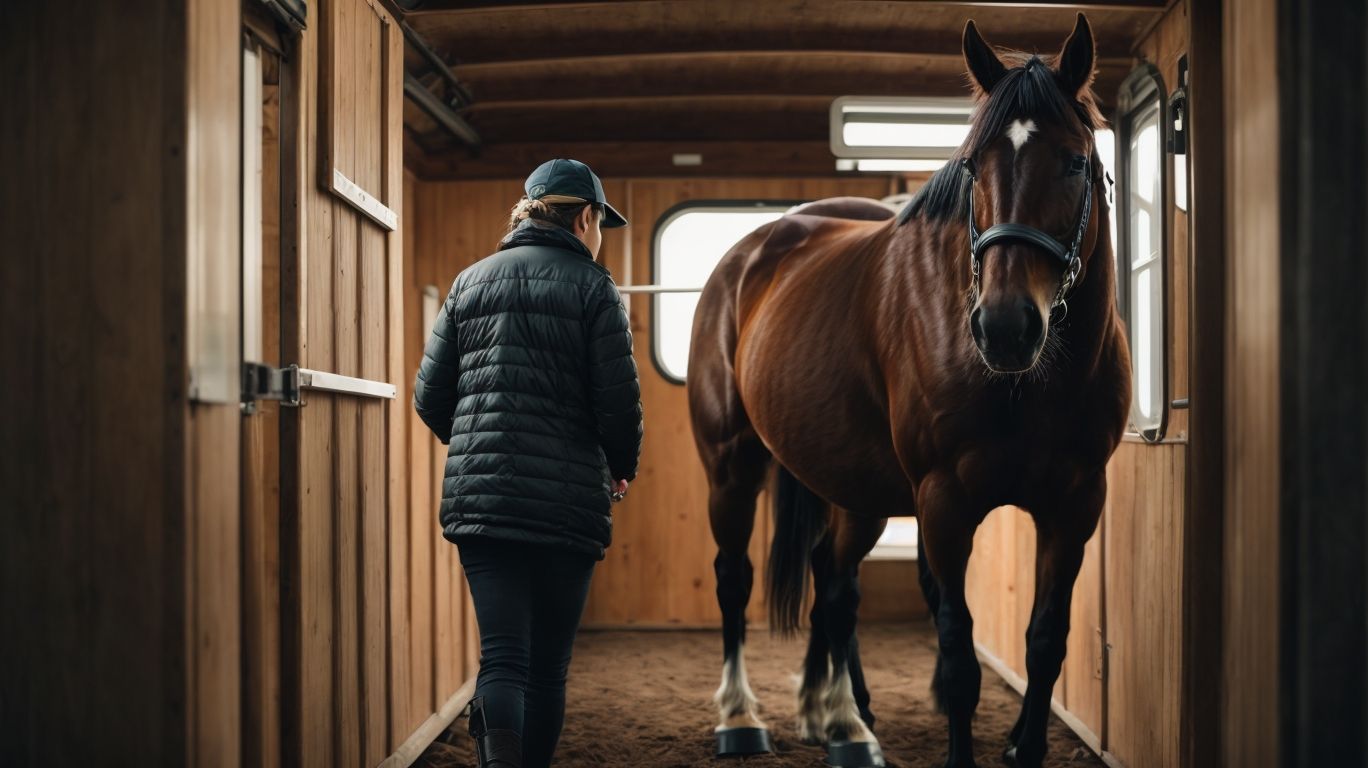Horses are magnificent creatures known for their unique behavior and natural instincts. Understanding horse behavior is crucial for effective training and management, particularly when it comes to trailer loading. By comprehending their innate instincts, herd mentality, and flight response, horse owners and trainers can develop strategies to train horses and ensure their safety during transportation.
Managing horse behavior is of paramount importance, as it enables safe handling, builds trust and a strong bond between the horse and its trainer, and facilitates effective training and performance in various disciplines. It helps create a harmonious relationship between humans and horses, allowing for a mutually beneficial partnership.
When it comes to trailer loading, specific training techniques need to be employed. Preparing the horse for trailer loading involves introducing it to the concept gradually, desensitizing it to the trailer’s sights and sounds, and using positive reinforcement training techniques to encourage desired behaviors. A gradual, progressive loading approach ensures that the horse feels comfortable and confident during the process.
However, there are common challenges that horse owners may encounter during trailer loading. These include resistance and fear of entering the trailer, reluctance to stay calm and confined, and overcoming past negative experiences. By understanding these challenges and implementing appropriate solutions, horse owners can address these issues and successfully load their horses into trailers.
To ensure successful trailer loading, it is essential to follow certain tips and guidelines. These may include maintaining a calm and patient demeanor, using appropriate equipment, creating a positive and supportive environment, and allowing sufficient time for the horse to adjust to the trailer.
While handling horse behavior and training for trailer loading can be a complex process, seeking professional help from experienced trainers and equine behavior specialists can provide invaluable guidance and expertise. Their knowledge and expertise can greatly assist in managing horse behavior and ensure safe and successful trailer loading experiences.
By understanding horse behavior, recognizing its importance, implementing effective training techniques, and seeking professional guidance when needed, horse owners can ensure the well-being and safety of their horses during trailer loading and create a positive and harmonious partnership with these magnificent animals.
Key takeaways:
- Creating a foundation of trust and understanding with your horse is essential for successful trailer loading. Start by gaining their trust, ensuring they are comfortable with being handled, and building a positive association with the trailer.
- Utilize desensitization techniques to gradually introduce your horse to the trailer environment. Familiarize them with the sights, sounds, and sensations of the trailer, rewarding calm and relaxed behavior.
- Implement positive reinforcement training techniques, such as rewarding desired behaviors with treats or praise, to encourage your horse to willingly enter and stay calm in the trailer. Avoid using force or punishment, as it can create negative associations and lead to resistance.
Understanding Horse Behavior
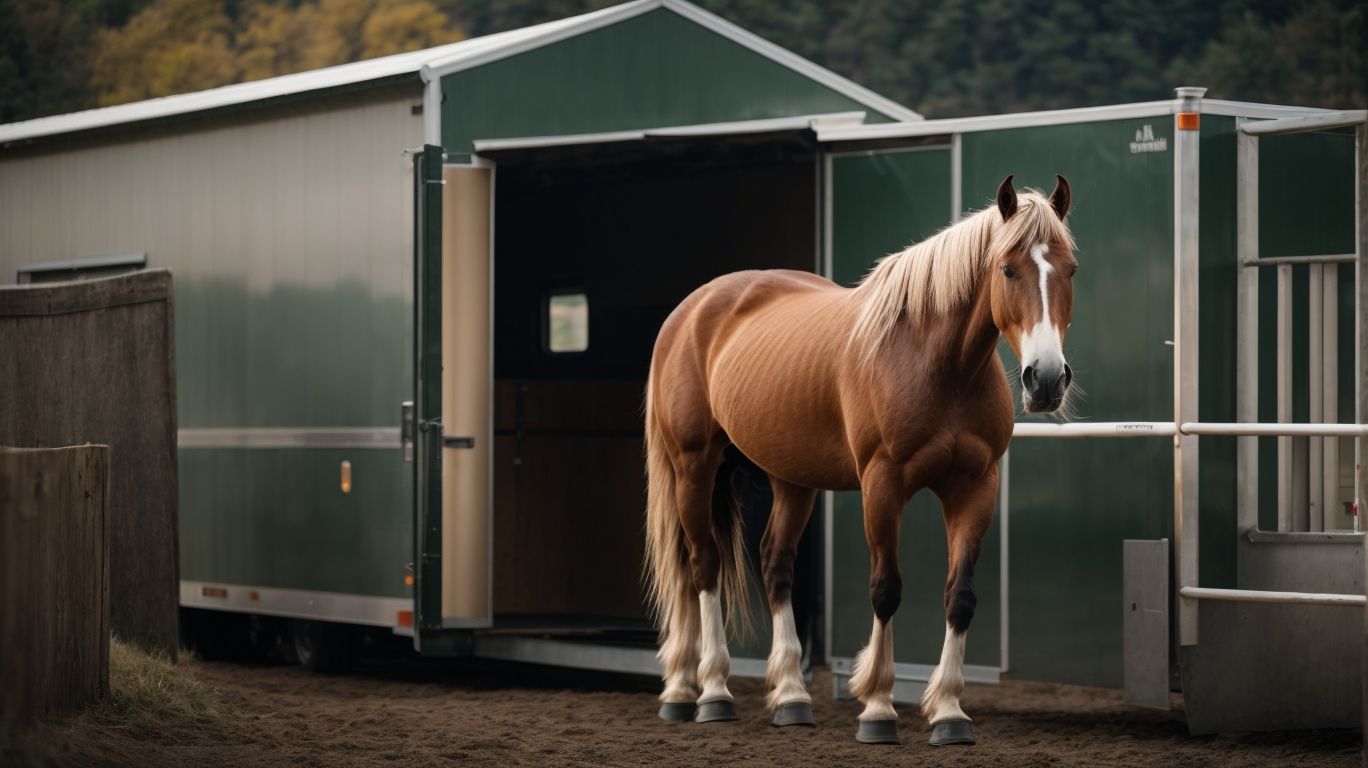
Photo Credits: Www.Horsespeakeducation.Com by Charles Roberts
Understanding horse behavior is key to successful horse training, especially when it comes to trailer loading. In this section, we’ll delve into the natural instincts of horses, their herd mentality, social hierarchy, and how it affects their behavior. We’ll also explore their flight response and the role of fear in shaping their actions. Buckle up as we embark on a journey to unravel the intricate world of horse behavior and gain valuable insights into training techniques.
Natural Instincts of Horses
Horses have a set of natural instincts that stem from their wild ancestors. These instincts, known as the natural instincts of horses, include flight response, herd mentality, and social hierarchy. The flight response causes horses to react quickly in the face of perceived danger. Horses also prefer to live in a herd, adhering to a social hierarchy with a dominant leader. Understanding these natural instincts of horses is crucial for effective horse behavior management. By recognizing and acknowledging the natural instincts of horses, handlers can create a safe environment, build trust, and train horses effectively. It’s truly fascinating how these natural instincts shape the behavior of these magnificent creatures.
Herd Mentality and Social Hierarchy
Horses have a natural instinct for herd mentality and social hierarchy. Understanding this aspect of their behavior is crucial for effective horse management. In a herd, horses have a hierarchical structure where dominant individuals establish leadership. This helps maintain order and ensures the safety of the group. Understanding how this social dynamic works can help handlers establish a respectful and trusting relationship with their horses. By recognizing and working within the horse’s natural behaviors, handlers can create a harmonious environment that promotes both the horse’s well-being and their own safety.
Fact: Horses have a strong need for social interaction and prefer to live in groups, as herd mentality and social hierarchy are essential for their overall mental and emotional well-being.
Flight Response and Fear
Horses have a natural flight response and can experience fear in certain situations, causing them to be highly sensitive to potential threats. It is essential for horse owners and handlers to fully grasp and effectively manage these behaviors. When a horse perceives any form of danger, its instinct is to flee, making it of utmost importance to establish a secure and protective environment for them. Utilizing proven training techniques, such as desensitization and positive reinforcement, can significantly aid in helping horses overcome their innate fear and feel more at ease when it comes to trailer loading. It is also vital to acknowledge and compassionately address any common challenges they may face, including resistance and negative past experiences. If necessary, seeking professional guidance can provide valuable assistance. By deeply comprehending and proactively dealing with their flight response and fear, handlers can ensure the ultimate safety and overall well-being of their beloved horses.
Importance of Horse Behavior Management
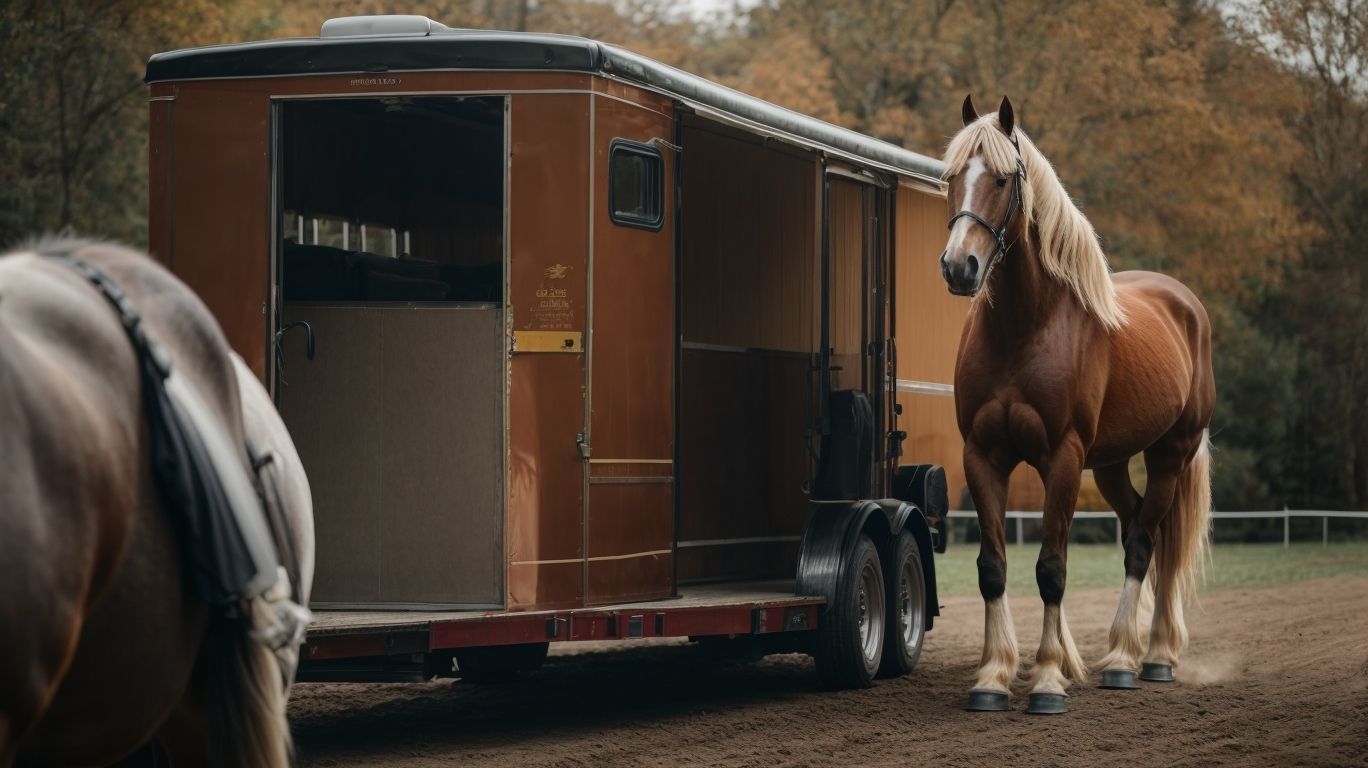
Photo Credits: Www.Horsespeakeducation.Com by Willie Jackson
Discover the incredible significance of horse behavior management. From the essential aspect of safe handling to building trust and bonds with these majestic animals, and finally, the art of effective training and performance. Uncover the secrets behind creating a harmonious relationship with horses and achieving outstanding results. Learn how proper horse behavior management techniques can revolutionize your horsemanship journey. So saddle up and join us as we explore the world of horse behavior management like never before.
Safe Handling of Horses
- Safe handling of horses is crucial to ensure the well-being of both the horse and the handler. Here are some steps to follow when handling horses:
- Approach the horse calmly and confidently, maintaining a relaxed posture.
- Always approach the horse from the front or side, avoiding sudden movements that may startle them.
- Use a lead rope to maintain control and guide the horse when necessary.
- Speak to the horse in a soothing tone to help them feel at ease.
- Avoid loud noises or sudden actions that may spook the horse.
- Pay attention to the horse’s body language and respond accordingly, giving them space if they seem agitated.
- Be mindful of your own body language, using gentle gestures and avoiding aggressive or threatening movements.
- When grooming or tacking up, take care to approach sensitive areas slowly and gently.
- Always prioritize safety, wearing appropriate protective gear and using secure equipment.
- Continue to educate yourself about horse behavior and safe handling practices to enhance your understanding and skills.
Fact: Horses are highly perceptive animals, capable of sensing a handler’s emotions and energy. Building a positive and trusting relationship with a horse through safe handling techniques can strengthen the bond between human and horse.
Building Trust and Bond with Horses
Building trust and establishing a strong bond with horses is crucial in forming a robust and effective relationship. Here are some essential tips to accomplish this:
- Invest quality time: Spend time wisely by engaging in grooming, petting, and engaging in conversation with your horse. By doing so, you can create a genuine sense of companionship.
- Consistency and patience: It is important to consistently handle your horse with calmness and patience because horses are highly sensitive to emotions.
- Positive reinforcement: To reinforce trust and encourage cooperation, make sure to reward desirable behaviors with treats or praise.
- Engage in groundwork exercises: Enhance communication and understanding between you and your horse by participating in groundwork activities like lunging or leading.
- Recognize body language: It is crucial to learn how to read and interpret your horse’s body language since it is their primary form of communication.
Remember that building trust and a bond with horses requires time and consistent effort. However, this rewarding process can lead to a harmonious partnership.
Effective Training and Performance
- E nsure effective training and performance in horses by incorporating these key factors:
- Establish clear communication: Use consistent cues and rewards to establish a clear understanding between the horse and trainer.
- Set achievable goals: Break down the training into smaller steps to help the horse understand and succeed.
- Provide positive reinforcement: Reward desired behaviors to encourage repetition and learning.
- Be patient and consistent: Training takes time and repetition, so it’s important to be patient and consistent in your approach.
- Consider individual needs: Each horse is unique, so tailor your training methods to suit their personality and abilities.
Fact: Studies have shown that horses respond best to training methods that prioritize positive reinforcement and focus on building a trusting and respectful relationship with the trainer. By incorporating these principles into your training approach, you can ensure effective training and performance in horses.
Training for Trailer Loading
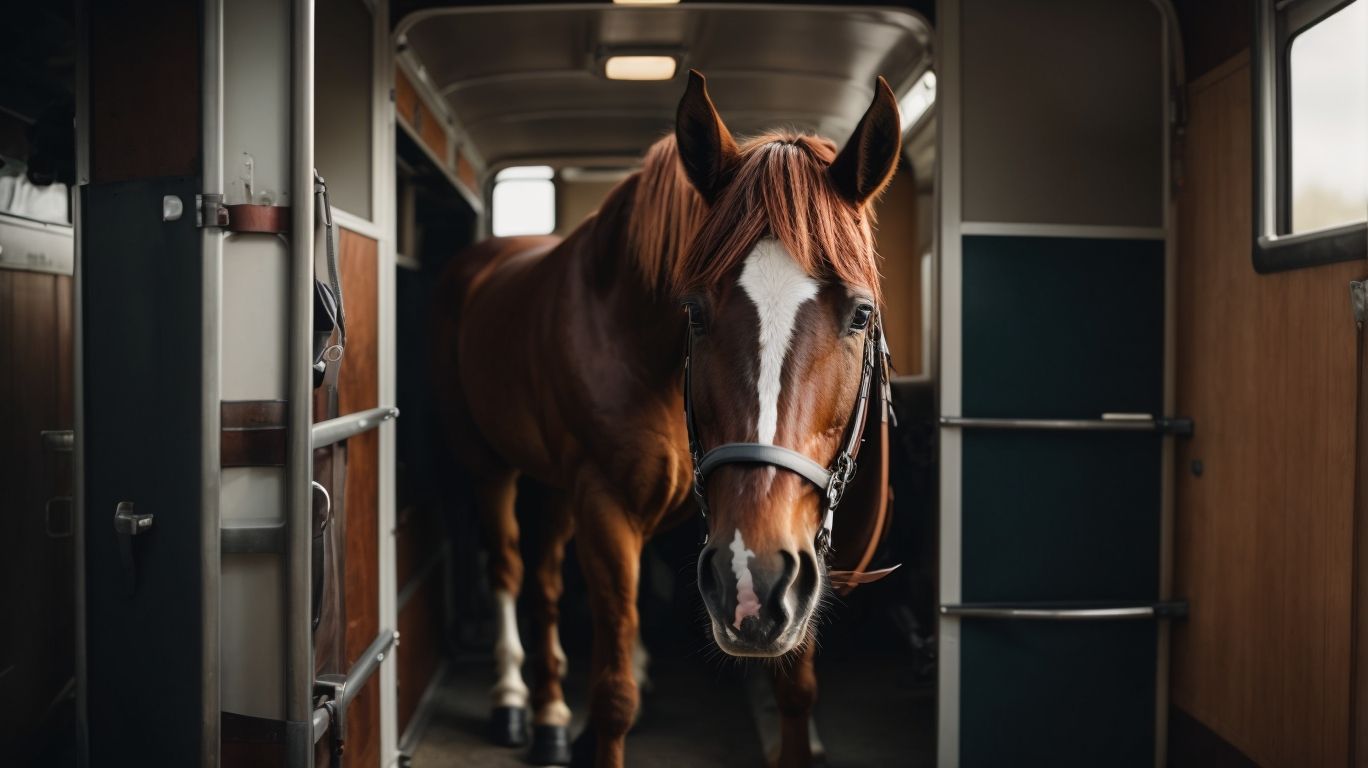
Photo Credits: Www.Horsespeakeducation.Com by David Ramirez
When it comes to trailer loading, training plays a crucial role in ensuring a smooth and stress-free experience for both the horse and the owner. In this section, we will explore various techniques and methods to effectively train horses for trailer loading. From preparing the horse for the process to desensitization to the trailer, positive reinforcement training techniques, and a gradual progressive loading approach, we’ll cover it all. We’ll also delve into common challenges that arise during trailer loading and their practical solutions. So, let’s dive in and discover valuable insights into refining this essential equestrian skill.
Preparing the Horse for Trailer Loading
- Preparing the horse for trailer loading is crucial for a successful and stress-free transport. Here are some steps to follow:
- Introduce the trailer gradually, allowing the horse to approach it voluntarily.
- Desensitize the horse to the trailer by touching and rubbing it all over.
- Practice loading and unloading using positive reinforcement, such as treats or praise.
- Teach the horse to stand calmly inside the trailer for increasing durations of time.
- Gradually increase the difficulty level by closing the trailer door and simulating movement.
Pro Tip: Patience and consistency are key when preparing the horse for trailer loading. Take your time and give the horse plenty of positive reinforcement to build trust and confidence.
Desensitization to the Trailer
To desensitize a horse to the trailer and achieve comfort and relaxation, it is crucial to follow a gradual and systematic approach. The first step is introducing the horse to the trailer from a secure distance, allowing them to observe and sniff it. Employing positive reinforcement, gradually bring the horse closer to the trailer and reward them for displaying calm behavior. Afterward, focus on desensitizing the horse to the various sights, sounds, and movements associated with the trailer. Commence by taking the horse for a walk around the trailer and gradually progress to walking them on and off the ramp. It is important to repeat these steps until the horse becomes completely at ease around the trailer. Throughout the desensitization process, make sure to maintain patience and consistency, as they are key factors in achieving success.
Positive Reinforcement Training Techniques
When it comes to training horses for trailer loading, positive reinforcement training techniques can be highly effective. These techniques focus on rewarding desired behaviors to encourage repetition and learning. Here are some examples of positive reinforcement techniques that can be used:
- Clicker Training: By using a clicker to mark the desired behavior and then following it with a reward, such as treats or praise, horses can be trained effectively.
- Target Training: By teaching the horse to touch a specific target, like a ball or a target stick, and then rewarding them for doing so, positive reinforcement can be incorporated into the training.
- Progressive Steps: Breaking down the trailer loading process into smaller, manageable steps and rewarding the horse at each successful completion is a positive reinforcement technique that can be employed.
- Patience and Consistency: Being patient with the horse and consistently rewarding their efforts in the training process is another important aspect of positive reinforcement training techniques.
Fact: Horses are intelligent animals and respond well to positive reinforcement training techniques, which makes the training process more enjoyable and effective.
</>
Gradual Progressive Loading Approach
- The gradual progressive loading approach, also known as the GPLA, is an effective method for training horses to load into trailers calmly and confidently. This approach breaks down the loading process into small, manageable steps, gradually building the horse’s trust and confidence.
- Here are the steps involved in implementing the gradual progressive loading approach:
- Prepare the horse for trailer loading by working on groundwork exercises to establish trust and obedience.
- Introduce the horse to the trailer by allowing them to approach it at their own pace and explore it without pressure.
- Use positive reinforcement techniques, such as rewards and praise, to encourage the horse to take small steps towards entering the trailer.
- Progressively increase the difficulty by asking the horse to take more steps inside the trailer, eventually reaching the point of full loading.
- If the horse shows any resistance or fear, take a step back and work on desensitization exercises before moving forward.
By following the gradual progressive loading approach, horse owners can help their horses overcome any anxieties or fears associated with trailer loading, ensuring a safer and more positive experience for both horse and handler.
Common Challenges and Solutions
When it comes to training horses for trailer loading, there are common challenges and solutions that riders may encounter. With effective solutions, these common challenges can be overcome. Here are some common challenges and their corresponding solutions:
- Resistance and fear of entering the trailer: Gradual desensitization to the trailer, using positive reinforcement techniques, can help alleviate the horse’s fear and build their confidence.
- Reluctance to stay calm and confined: Implementing calm and consistent training methods, providing a comfortable and familiar environment inside the trailer, and rewarding calm behavior can help horses feel more at ease.
- Overcoming past negative experiences: Patience, understanding, and giving the horse time to trust again are crucial in helping them overcome past traumas. Slowly reintroducing trailer loading and focusing on positive reinforcement can assist in building their confidence.
By addressing these common challenges with the appropriate solutions, riders can improve their horse’s trailer loading experience and ensure a safer and more positive training process.
Resistance and Fear of Entering the Trailer
When it comes to resistance and fear of entering the trailer, it is important to address the root causes and take a patient and gradual approach. Some techniques that can help include desensitization exercises, positive reinforcement training, and gradually increasing exposure and time spent inside the trailer. It is crucial to create a positive and calm environment for the horse, and to never force or rush them into the trailer. Seeking the help of a professional trainer who specializes in trailer loading can also be beneficial. Remember, every horse is unique and may require different strategies for overcoming their fears.
Fact: Horses have a natural flight response which can make them resistant to entering trailers. Resistance and fear of entering the trailer should be approached with patience and understanding. By implementing desensitization exercises, positive reinforcement training, and gradually increasing exposure to the trailer, the horse can gradually overcome their fears. It is essential to maintain a positive and calm environment throughout the process and avoid forcing or rushing the horse. Consulting with a professional trainer who specializes in trailer loading can provide valuable guidance and assistance. It is important to remember that each horse is unique and may have individual strategies for overcoming their resistance and fear of entering the trailer.
Reluctance to Stay Calm and Confined
Horses may sometimes exhibit a hesitancy to remain calm and remain confined during the process of loading onto a trailer. This reluctance can stem from feelings of fear, anxiety, or past negative experiences. It is crucial to address this issue by utilizing positive reinforcement training techniques in order to cultivate trust and confidence in the horse. Implementing a gradual and progressive loading approach can also contribute to the horse feeling more at ease and secure. Patience and consistency play pivotal roles in overcoming this reluctance and ensuring a successful trailer loading experience. Additionally, seeking assistance from a qualified horse behavior specialist or trainer can offer valuable guidance and support in effectively managing and addressing this behavior.
Overcoming Past Negative Experiences
When training a horse to load into a trailer, it is essential to overcome past negative experiences. To achieve this, follow these tips. Start by creating a safe and calm environment, eliminating any triggers that might remind the horse of those negative experiences. Employ positive reinforcement techniques to gradually gain the horse’s trust and build their confidence. For instance, you can reward the horse for every small step taken towards the trailer, like approaching it or sniffing it. While training, it is crucial to be patient and consistent, allowing the horse to progress at their own pace. With proper guidance and time, horses can indeed conquer their fears and leave behind any negative experiences with trailer loading.
Tips for Successful Trailer Loading
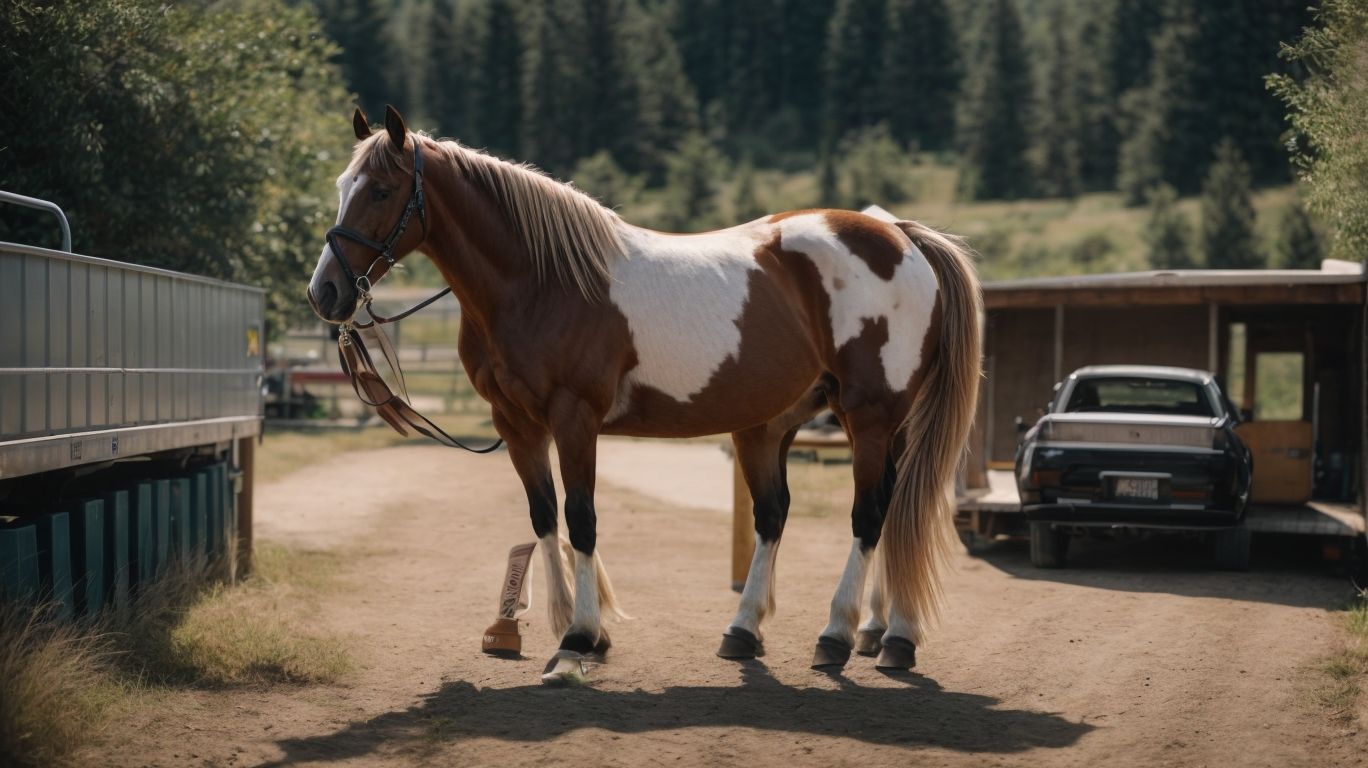
Photo Credits: Www.Horsespeakeducation.Com by Thomas Jackson
Tips for Successful Trailer Loading
To ensure successful trailer loading for horses, it is important to follow these tips:
- Establish trust: It is crucial to build a bond with your horse through consistent groundwork and positive reinforcement.
- Desensitize: Gradually expose your horse to the trailer environment, including the sound of ramps and confined spaces.
- Practice leading: Teach your horse to walk calmly and obediently beside you, responding promptly to cues.
- Target training: Incorporate the use of a target to guide your horse into the trailer, providing a clear visual aid.
- Take it slow: Allow your horse to approach and enter the trailer at their own pace, rewarding any effort they make.
- Gradual confinement: Start by closing the trailer doors for short periods of time, and gradually increase the duration.
- Positive experiences: During the loading process, utilize treats, praise, and breaks to create positive associations with the trailer.
- Patience and consistency: It is important to practice regularly and remain patient with your horse’s progress, aiming for gradual improvement.
Seeking Professional Help
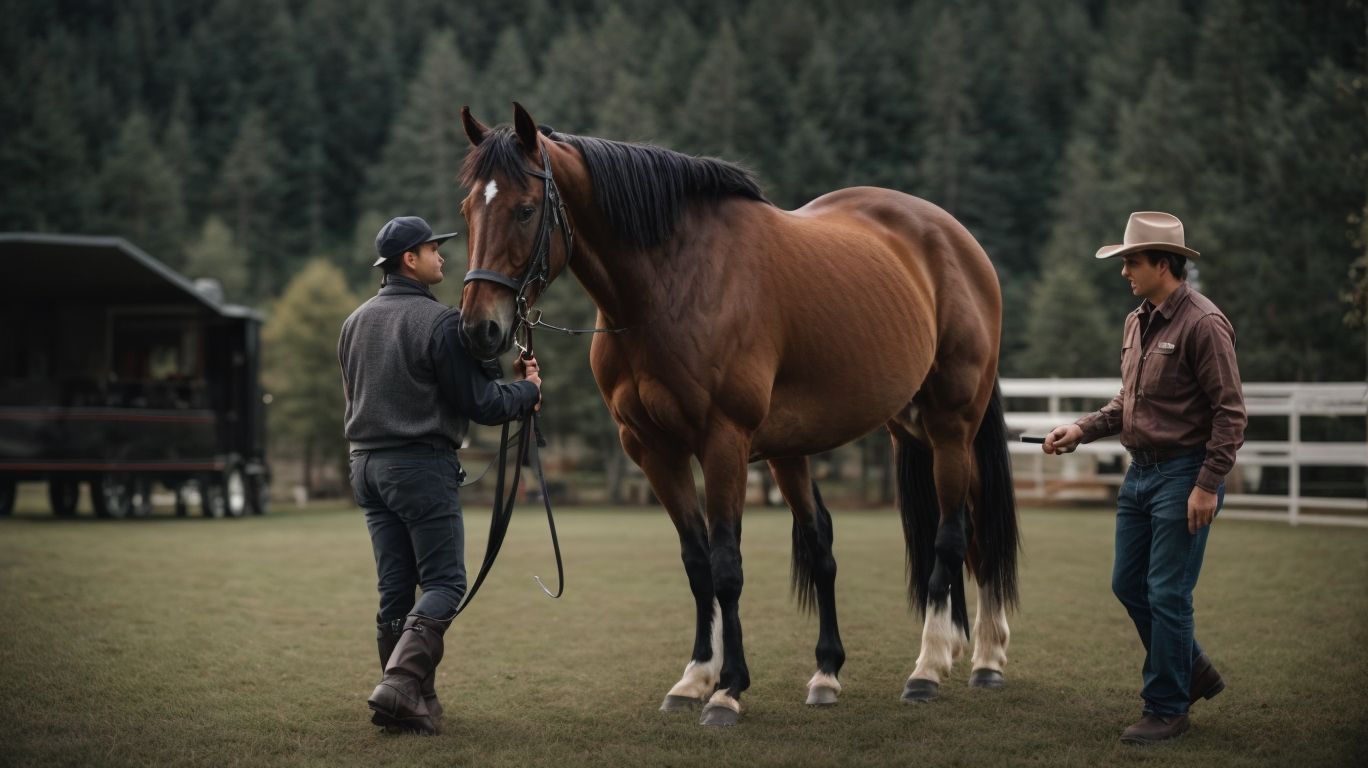
Photo Credits: Www.Horsespeakeducation.Com by Alexander Torres
When it comes to horse behavior management, seeking professional help is crucial. Trainers with experience in trailer loading can provide valuable guidance and expertise. They can assess the specific needs of your horse and tailor a training program accordingly. Professional trainers can also address any underlying behavioral issues that may be causing difficulties with trailer loading. Their knowledge and techniques can help ensure a safe and stress-free experience for both you and your horse. Remember, professional help is an investment in your horse’s well-being and your own peace of mind.
I once had a horse that was extremely fearful of trailers. No matter what I tried, she would refuse to go near them. Frustrated and worried about her safety, I decided to seek professional help. I found a trainer who specialized in trailer loading and working with anxious horses. Through patient and gentle training methods, the trainer helped my horse overcome her fear and learn to load into the trailer confidently. It was a transformative experience that not only improved our trailer loading sessions but also strengthened our bond and trust. Professional help truly made a difference in our journey.
Some Facts About Horse Behavior Management – Training for Trailer Loading:
- ✅ Calm and controlled energy is crucial in trailer training as horses can associate anxiety with the trailer. (Source: Our Team)
- ✅ Patience is necessary in trailer training as horses take time to adjust and accept the trailer as a safe place. (Source: Our Team)
- ✅ Instant gratification is important in trailer training to reward any efforts made by the horse towards moving into the trailer. (Source: Our Team)
- ✅ Positive reinforcement and praise are essential in the learning process of trailer training to reinforce skills and strengthen the bond between horse and trainer. (Source: Our Team)
- ✅ Regular practice is necessary for successful trailer training as mastery is not achieved after just one trial. (Source: Our Team)
Frequently Asked Questions
1. How can I effectively train my horse for trailer loading?
Trailer training requires patience, trust, and effective communication. Start by communicating calm and controlled energy through your body language to avoid associating anxiety with the trailer. Use positive reinforcement and rewards to encourage your horse’s efforts. Practice regularly and provide thorough groundwork training to ensure a comfortable experience for your horse.
2. What are some reasons why loading horses into a trailer can be frustrating?
There are several reasons why loading horses can be frustrating. Horses are innate herd animals and may be reluctant to leave their herd. Lack of thorough groundwork training can also make loading challenging. Negative past experiences, such as accidents or trauma, can contribute to a horse’s reluctance to load.
3. How can I address fear and negative experiences during trailer training?
If your horse has learned to fear the trailer due to past accidents or trauma, a proactive approach is needed. Take the time to understand and address their fear. Reprogram their behavior using positive reinforcement and gradually desensitize them to the trailer. Building confidence through groundwork techniques and short rides can also help overcome fear.
4. What safety precautions should I take during trailer loading?
Prioritize safety during trailer loading by taking precautions such as using a rubber head protector and wrapping your horse’s legs. Ensure the trailer tie is secure but allows for quick release in case of panic or emergency. Familiarize your horse with the trailer and the process of loading and unloading to minimize potential problems.
5. Can you provide an example of a trailer loading incident?
In a personal experience shared by Tik Maynard, one of the horses, Shadow, panicked during loading and jumped into the feed manger, causing her head to be pulled into an unnatural position by the trailer tie. The horse was eventually freed, but suffered minor injuries. This incident demonstrates the potential dangers of trailer loading and emphasizes the need for proper preparation and thoughtful understanding of the horse’s instincts.
6. How can selective breeding impact a horse’s temperament during trailering?
Selective breeding has improved horses’ temperament and tractability, but their basic nature still remains. Horses have a natural wariness of confinement due to their evolution as prey animals. Understanding this instinct and taking the time to train and acclimate your horse to the trailer can contribute to a more successful trailering experience.
